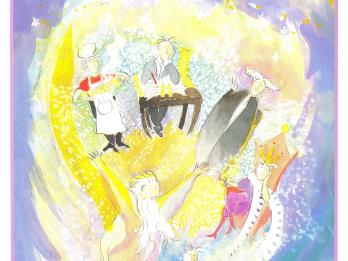Letter
Asenath Barazani
Early 17th Century
And so let it be known to your Excellency what happened to the letter that your Excellency sent me with the etrogs [citrons]. The letter was not handed to me until the [week of the] Sabbath of Vayetze [seven weeks after Sukkot]. When I saw it, I was surprised and I sent after my distinguished friend and I argued with him. I said to him, “What are these things that you all are doing to me? What is the wrong by which you have wronged me? How shall the holy congregation of ‘Ana [may God preserve it!] send me a letter prior to the holiday of Sukkot, yet you hide it from me and not tell me about it until now? For I would have responded to them. Woe for the shame and humiliation!” My distinguished friend said, “It was not my fault but the fault of Signor Musa Galbi. He did not allow me to deliver the letter to you. He charged me, ‘Do not disclose to her, until we shall see what the money for the etrogs will be, and afterwards we will disclose to her and deliver the letter to her.’” I also replied to him, “As the rabbis said, ‘there is no wisdom in elders or reason in the youth.’ Was I in authority to bind you and to take the money from you by force? What kind of plan would that be? A wretched and ill-advised plan! You should only have delivered the letter to me, and afterwards your desire should be that whenever the money should fall into your hand, then you would give me the money.” For your Excellency had sent to give to me three kuruş from the money for etrogs.
And now it is my desire and request that your Excellency should send to Musa Galbi and to my distinguished friend and charge them, not to do likewise to me another time! How can it be that your Excellency sent me a letter from the time of the holiday of Sukkot, and they hid it from me? Such conduct is not decent, it is not honorable! That is why my reply was tardy, for I had not known that your Excellency had sent me a letter or anything.
As for the matter of the holy congregation, your Excellency said, “What business do you have to pour forth your speech on their assemblage, for it is not worthwhile to prolong their number?” And I said, all the congregation are considered honorable and important to me. I said, let it be counted to me for the sake of remembrance that they be in order; for it is a disgrace to mention the younger before the elder, as the verse relates: Isaac trembled in fear (Genesis 27:33)—of what was our father Isaac fearful? He said, what sin have I committed, that I blessed the younger before the older and changed the order of relationship? From this we learn that it is not decent to mention the younger before the elder.
As for the matter of S. Hassan, you said I had remembered him for blessing, he and his mother. Had not your Excellency charged me, how had I known him? And you had already informed us when the rabbi was still alive, you had truly sent that there is found among us this day one man, of goodly parentage and distinguished lineage, and he understands and heeds the words of the sages, and he is captain of a ship, that there is no person in the community who can outdo him in generosity or the like. And I had admonished you several times, that if you send a notice or a letter, you should have it written by him, and order for him and his children good wishes to awaken his compassion in his endeavor in all that God empowers him to do. Is not the man Hassan son of the late Samuel, and his three sons and his mother, who is also able to repay the righteous women? And this is my word to you, that you should not forget the things that your eyes saw, for the portion that we sent to you by the hand of the gentile, he and his mother endeavored and they were the cause. I also remembered and blessed him for your words. Whomever you bless is blessed, and whomever you curse is cursed. And whatever your Excellency shall instruct me, I shall follow that way, I shall not deviate right or left.
As for the judgment which your Excellency has declared, that we have no need of its rulings and the like. Blessed is the Lord who has enlightened us and showered us with the light. . . .
Credits
Published in: The Posen Library of Jewish Culture and Civilization, vol. 5.



